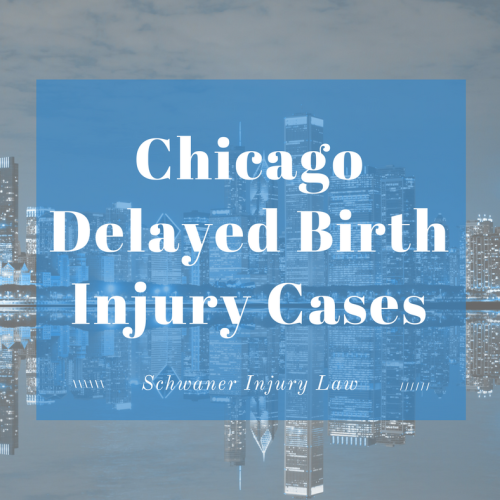
Chicago Delayed Birth Injury Cases – When is a Doctor at Fault?
Has your family suffered a Delayed Birth Injury? While every pregnant woman has likely heard horror stories about days-long labor, the risk factors associated with delayed births are serious, and there is no room for bragging rights about which mom was in labor the longest.
According to experts, there is an 18-hour window during which babies can safely remain in the birth canal, and babies who spend more time than that are considered victims of fetal distress and are at risk of serious injury or death.
What Happens with Delayed Birth?
Table of Contents
In 2015, one Chicago-area woman won a $1.5 million wrongful death settlement when her baby showed signs of fetal distress during delivery, signs that were initially ignored by her doctor, who dismissed the first phone call, and only ordered an emergency cesarean section after a second telephone call was made. The baby was stillborn due to a long-term loss of oxygen, which medical evidence showed occurred during the hour between the first and second call to the obstetrician.
Babies who are in the birth canal for a longer period of time than is considered safe face significant risks, including:
- Compression of the baby’s organs. While a baby’s body is designed to be pliable and flexible enough to survive pressure on the lungs, brain, spine and other internal organs during childbirth, that survival mechanism is not indefinite. Babies that linger for hours in the birth canal are at risk of oxygen deprivation, which can lead to devastating injuries and potentially, death, as was the case in the abovementioned lawsuit.
- Brain injuries. There are a wide range of brain injuries associated with delayed birth including those related to fractures, bleeding in the brain and oxygen deprivation. Cerebral palsy, which causes problems with motor function and can potentially lead to impaired cognitive, is also a potential injury, as are both classic autism and Asperger’s syndrome. Children with these disorders often have trouble with socialization, communication and behavior, although those with Asperger’s tend to be higher functioning and have higher IQs than those with classic autism.
- Brachial plexus injuries. Babies that are unable to exit through the birth canal because their shoulders become trapped behind their mother’s pubic bone are at a high risk of brachial plexus injuries. The Brachial plexus nerves lead from the spinal cord through the neck, and control arm, hand and finger mobility. Injuries can range from mild stretching that resolves itself within a few months or ruptures or tears that can lead to permanent paralysis.
Prevention of Delayed Birth Injuries
 While there are a variety of different reasons children suffer from delayed birth injuries – the baby was too large for a traditional vaginal birth or the doctor administered an epidural that was too strong, making it impossible for the mother to effectively push to deliver the baby, for example – a Cesarean section can help prevent any such injuries.
While there are a variety of different reasons children suffer from delayed birth injuries – the baby was too large for a traditional vaginal birth or the doctor administered an epidural that was too strong, making it impossible for the mother to effectively push to deliver the baby, for example – a Cesarean section can help prevent any such injuries.
More than 30 percent of babies born each year are delivered by Cesarean section, and although the procedure comes with its own risk factors, preventing brain damage or physical injury is a major factor in choosing this method of delivery.
If a baby shows signs of distress during birth – or if problems are identified during pregnancy that suggest a complicated delivery – a Cesarean section should be the first standard of care.
Delaying a C-section during a complicated delivery can lead to its own set of complications and related birth injuries.
Injuries Related to Delated C-Sections
Doctors may be reluctant to perform a C-section for a variety of reasons, but delaying the procedure once there are signs of fetal distress can lead to devastating consequences.
WHEN SHOULD A DOCTOR INITIATE A C-SECTION?
The following emergencies are all reasons for a C-section, including:
- A slow fetal heart rate, which signals that there is fetal distress.
- Placenta previa, which could cause the placenta to detach from the uterine wall, depriving the baby of vital oxygen.
- Uterine rupture, which creates an unsafe environment for the baby and puts both mother and child at risk of death.
- Umbilical cord prolapse, a condition that can cause compression of the cord, cutting off oxygen,
In some instances, physicians fail to schedule a C-section despite warning signs, including signs of fetal distress, or they wait too long to take action.
Whatever the reason a doctor has for delaying a C-Section – cost, insurance coverage, the lack of an available surgical room, failure to recognize symptoms of fetal distress – to do so can lead to a variety of injuries including:
- Oxygen deprivation, leading to infant brain damage. A baby can be deprived of oxygen due to a variety of factors during childbirth, including a compressed umbilical cord or a placenta that detaches from the uterine wall too soon. Oxygen deprivation can lead to injuries that range in severity from mild cognitive disabilities to a vegetative state.
- Physical injuries. If the baby is stuck in the birth canal, brachial plexus injuries are possible, especially if the doctor continues to attempt vaginal delivery, putting added strain on the fairly delicate brachial plexus nerves.
- Physical and developmental delays. Any sort of birth injury can cause developmental delays that can change the course of a child’s life.
- Death. Long-term loss of oxygen can be fatal, and in the case of fetal distress, delaying a C-section can be deadly.
WHEN IS A DOCTOR AT FAULT FOR A DELAYED BIRTH INJURY?
If a doctor fails to properly monitor a fetus for signs of distress or fails to communicate with birthing staff, he or she could be considered negligent if a baby suffers injuries as a result of delayed birth.
Other potential errors include:
- Failure to induce labor in cases where the baby is larger than normal.
- Failure to perform a Cesarean section if the placenta separates from the uterine wall, causing loss of oxygen.
- Failure to diagnose maternal conditions that could potentially impact delivery.
What Should I Do If Delayed Birth Caused My Baby’s Injury?
If your child suffered a birth injury that was caused by a medical mistake or a misdiagnosis that led to a delayed birth, you may want to pursue legal options.
Your doctor, an over-populated, understaffed birthing unit, overworked nurses who fail to adequately monitor signs of fetal distress and a hospital that is underequipped for performing a Cesarean section may all be held liable for the injuries your baby suffered.
Often, such injuries require physical and occupational therapy, surgery or lifelong care, a burden you should not have to shoulder on your own.
Finding an experienced Chicago-based medical malpractice attorney who understands the potential problems associated with delayed births could help you receive the compensation you need to cover your child’s needs, potentially for life.












